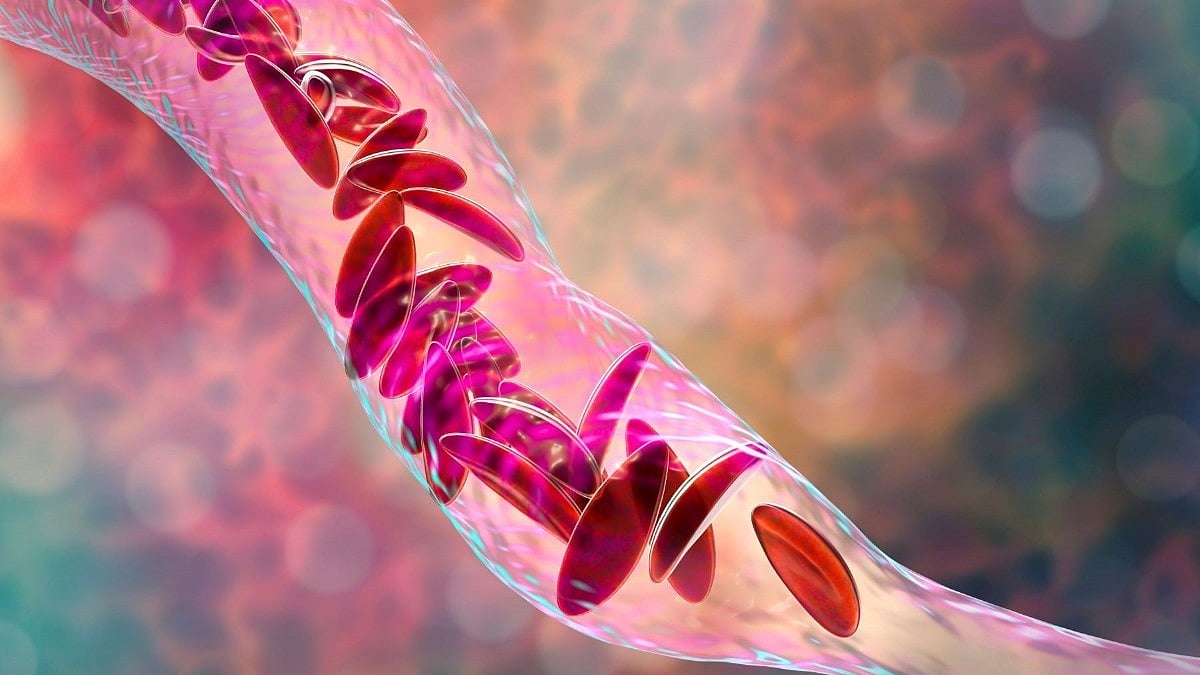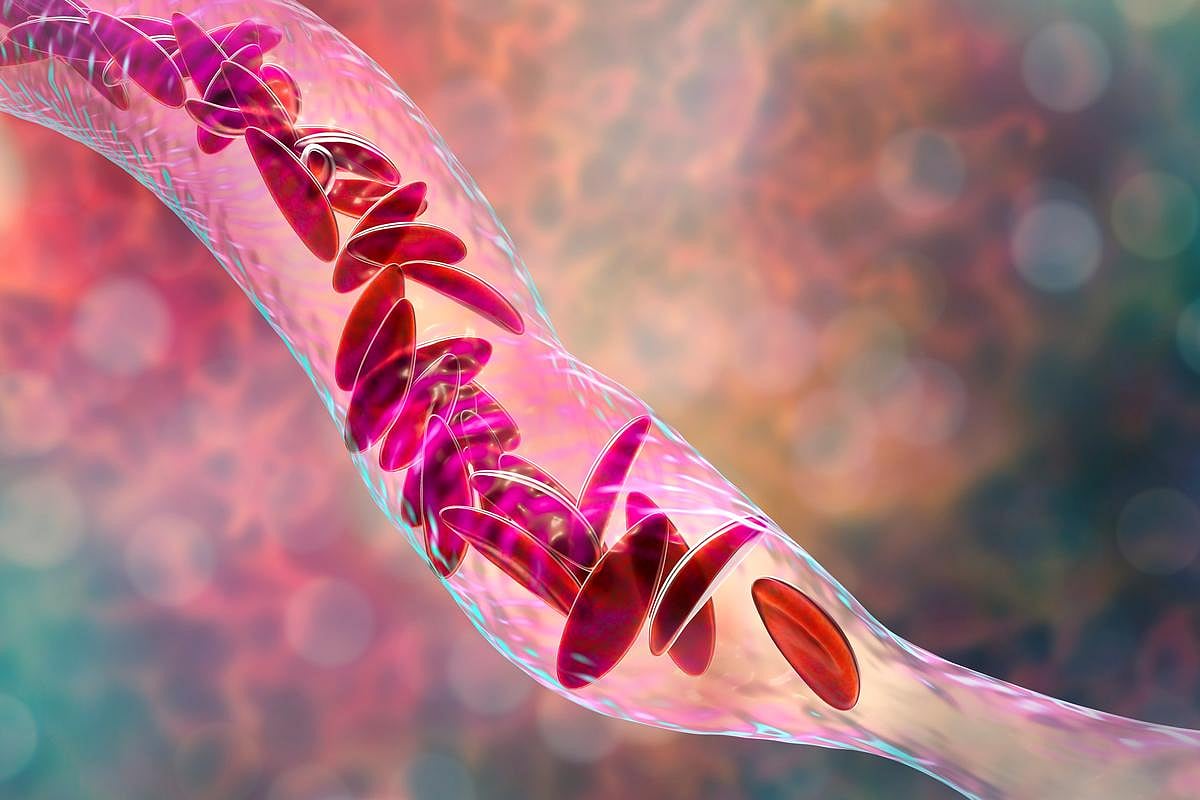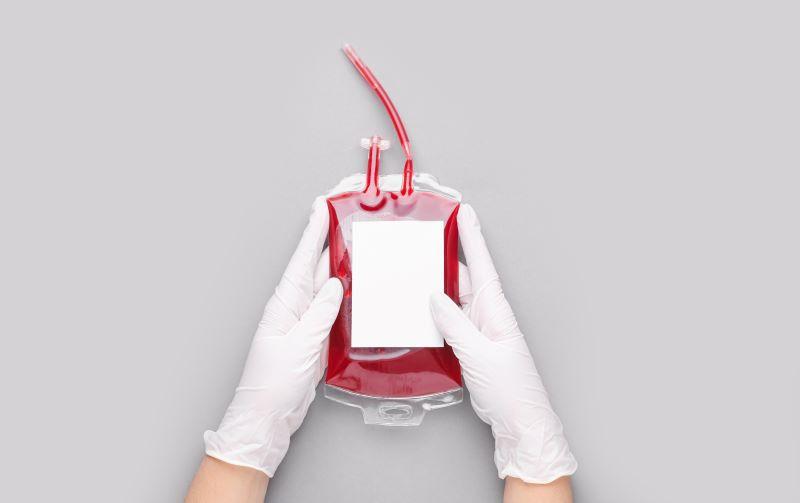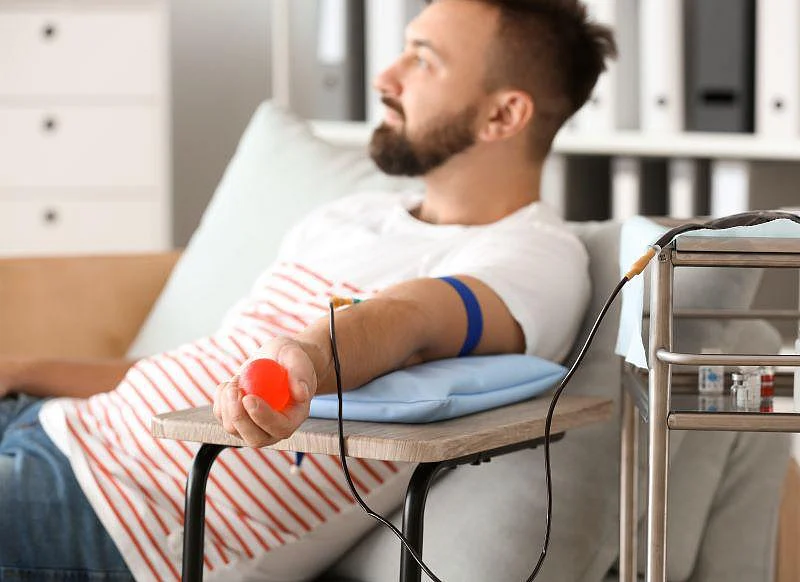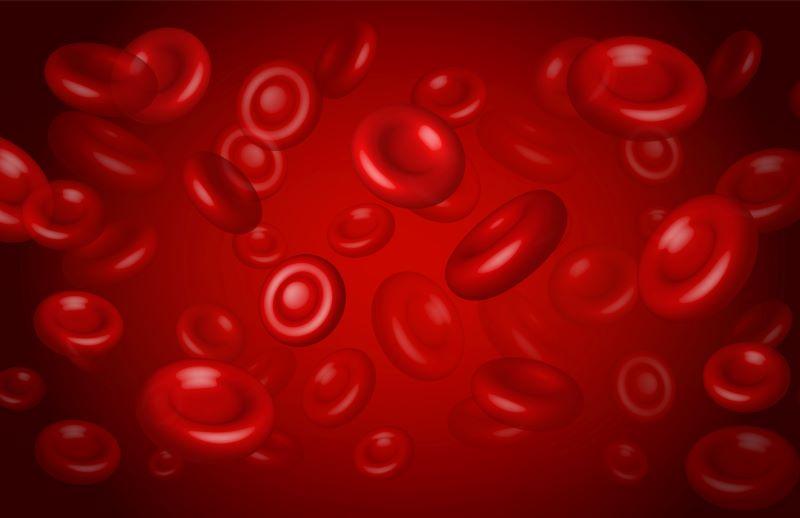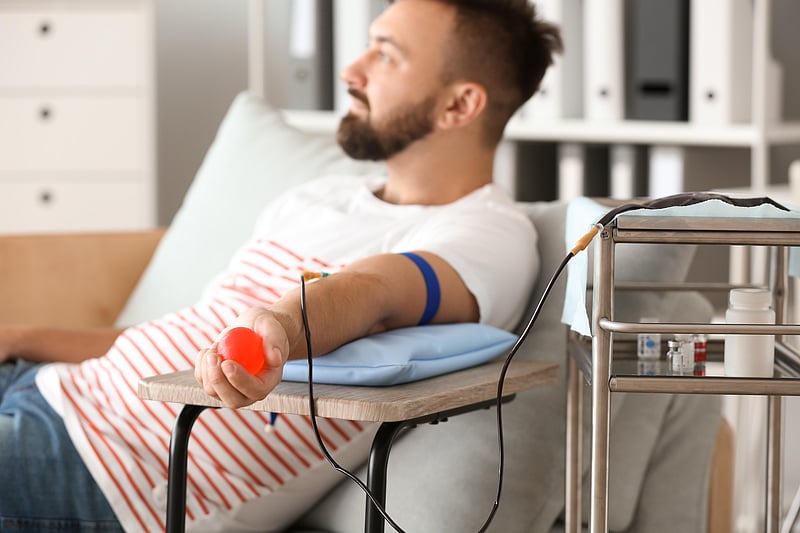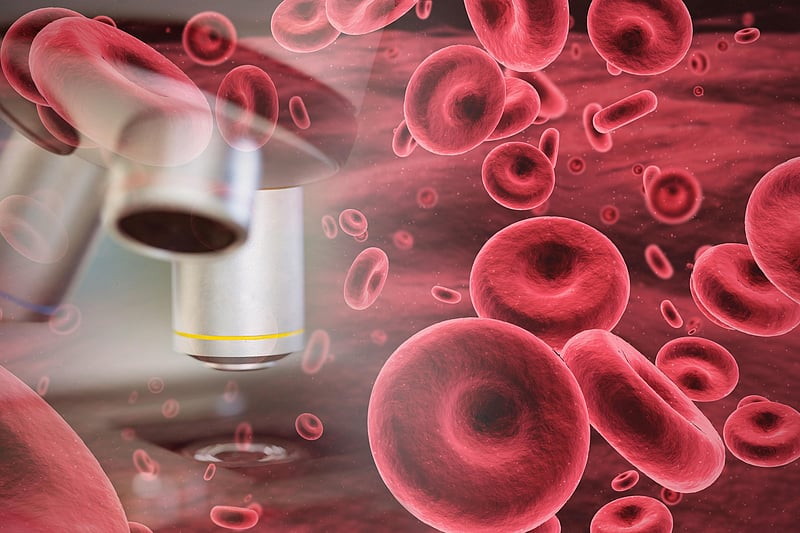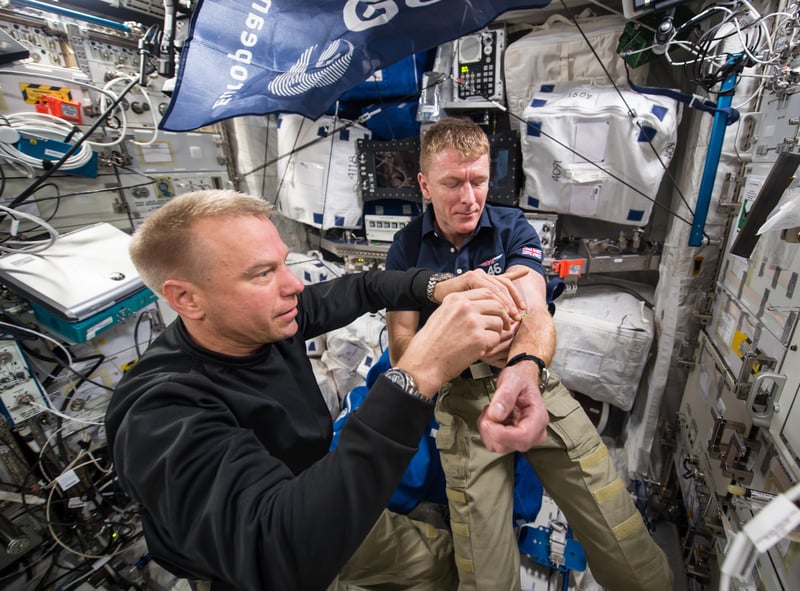Get Healthy!
Results for search "Blood Disorders".
20 Feb
Extreme Exercise May Damage Red Blood Cells, New Study Finds
A new study finds athletes who ran ultra-long races — from 25 miles to more than 100 — showed signs of red blood cell damage that could affect how well oxygen and nutrients are delivered throughout the body.
Health News Results - 32
Ultra-marathon runners must be incredibly fit to endure races that can extend more than 100 miles, but their bodies pay a price for their athleticism, a new study says.
Extreme endurance runners experience a breakdown of their normal red blood cells during a race, putting them at increased risk of anemia, researchers reported Feb. 18 in the journal
University of Colorado football coach Deion Sanders said Tuesday he was undergoing surgery to treat ongoing blood clot issues, and less than a day after the procedure, returned to practice Wednesd...
- I. Edwards HealthDay Reporter
- |
- October 9, 2025
- |
- Full Page
An oral chemotherapy drug can safely and effectively manage sickle cell disease in children, a new study says.
Children taking hydroxyurea had fewer ER visits and spent fewer days in the hospital compared to kids not taking the drug, researchers reported April 17 in the journal
Women with sickle cell disease often have pain crises around the time of their period, and researchers now think they know why.
Inflammation increases significantly in women during their period, and that could be contributing to sickle cell pain events, researchers reported.
“The amount of inflammation is significantly elevated in the follicular phase, or first half, of the me...
- HealthDay Reporter
- Dennis Thompson
- |
- April 14, 2025
- |
- Full Page
For 21 years, Sebastien Beauzile lived with the chronic pain of sickle cell anemia.
Now, thanks to a groundbreaking genetic treatment, he is the first person in New York to be cured of the disease.
"Sickle cell was like a blockade for me, but now it's just like a wall that I just jumped over," Beauzile said in a report published by CBS News.
The hospital used an...
- HealthDay Reporter
- I. Edwards
- |
- March 17, 2025
- |
- Full Page
People with sickle cell disease often struggle with memory, focus, learning and problem solving, setting them back in school and the workplace.
That could be because their brains are older than expected for their age, a new study published recently in JAMA Network Open says.
Brain scans revea...
- HealthDay Reporter
- Dennis Thompson
- |
- January 24, 2025
- |
- Full Page
Japanese researchers say they have found a pill that works as well as existing medication to prevent blood clots after heart valve surgery, with fewer trips to the doctor.
Unlike warfarin, the standard treatment,
Too many American tourists looking for cheap cosmetic surgeries alongside their beach time are winding up dead in the Dominican Republic, a new report finds.
Between 2009 and 2022, 93 people -- almost all young or middle-aged women -- have died after undergoing tummy tucks, liposuction or buttock enhancement procedures in that country's clinics, reports a team from the U.S. Centers for Di...
- HealthDay Reporter
- Ernie Mundell
- |
- January 26, 2024
- |
- Full Page
Casgevy, a groundbreaking treatment that was approved to treat sickle cell disease in December, was given the U.S. Food and Drug Administration's blessing on Tuesday to treat another inherited blood disorder.
Casgevy is the first CRISPR-based medicine, where gene editing is used to develop the treatment, to be approved for use in the United States.
The one-time dose permanently chan...
- HealthDay Reporter
- Robin Foster
- |
- January 17, 2024
- |
- Full Page
The U.S. Food and Drug Administration on Friday approved two milestone gene therapies for sickle cell disease, including the first treatment ever approved that uses gene-editing technology.
Casgevy, developed by Vertex Pharmaceuticals of Boston and CRISPR Therapeutics of Switzerland, is the first medicine available in the United States to treat a genetic disease using the CRISPR gene-edit...
- HealthDay Reporter
- Dennis Thompson
- |
- December 8, 2023
- |
- Full Page
It's possible that the cause of spontaneous, recurring brain hemorrhages can be passed through blood transfusion, researchers say.
The likelihood of this happening is very slim, however.
Still, "blood transfusions are relatively common, which makes possible negative effects an important public health issue,"said study co-author
- HealthDay Reporter
- Cara Murez
- |
- September 12, 2023
- |
- Full Page
When astronauts travel to space, the experience depletes their red blood cells and bone, according to a new study.
Fortunately, it appears their bodies can eventually replenish them after they've returned to Earth, thanks to fat stored in the bone marrow.
"We found that astronauts had significantly less fat in their bone marrow about a month after returning to Earth,"said senior st...
- HealthDay Reporter
- Cara Murez
- |
- August 23, 2023
- |
- Full Page
The 15th century prince who inspired the literary vampire Dracula may have had medical issues that caused him to cry tears of blood, according to researchers unearthing this ancient mystery.
The prince, who was also a military leader, was known as Vlad III, Voivode of Wallachia and as Vlad the Impaler. He was also called Vlad Drăculea, translating to "the son of the dragon," and may ...
- HealthDay Reporter
- Cara Murez
- |
- August 18, 2023
- |
- Full Page
Whether the gender of a blood donor could affect the recipient's survival was an unanswered question in medicine. Until now.
"Some observational studies had suggested female donor blood might be linked with a higher risk of death among recipients compared to male donor blood, but our clinical trial found that isn't the case,"co-lead author
An experimental injectable drug appears effective in reducing bleeds in patients with hemophilia A and B, according to a pair of new clinical trials.
Two-thirds of people with treatment-resistant hemophilia who were treated with the drug fitusiran had no bleeds at all after nine months, versus just 5% of people treated with drugs that enhance clotting, according to a trial published onlin...
- HealthDay Reporter
- Dennis Thompson
- |
- March 31, 2023
- |
- Full Page
U.S. Food & Drug Administration policies that have limited blood donations from men who have sex with men may soon ease.
At the moment, FDA policy does not allow blood donation from men who have had sex with other men in the past three months. That's already a shorter timeframe than in the past, when the agency required a one-year gap.
The agency is now considering switching to ques...
- HealthDay Reporter
- Cara Murez and Robin Foster
- |
- December 1, 2022
- |
- Full Page
A single blood test that can screen for more than 50 cancers seems to work fairly well in the real world, a preliminary study reveals.
Researchers found that of over 6,600 apparently healthy people aged 50 and older, the blood test detected a possible cancer "signal" in roughly 1%. When those individuals had more extensive testing, cancer was confirmed in 38%.
- HealthDay Reporter
- Amy Norton
- |
- September 12, 2022
- |
- Full Page
A network that receives and supplies blood for transfusions nationwide is calling for more diverse blood donors.
Less than 20% of blood donations are from people of color, but those donations are essential. Frequently transfused patients often require blood from donors with similar ethnic and racial backgrounds.
Those who need frequent transfusions include people with
The risk of suffering a stroke at an early age may depend partly on a person's blood type, a large study suggests.
When it comes to the risk of ischemic stroke -- the kind caused by a blood clot -- studies have hinted that blood type plays a ro...
- HealthDay Reporter
- Amy Norton
- |
- September 1, 2022
- |
- Full Page
The thickness of a person's blood can be a matter of life or death if they contract COVID-19, a new study suggests.
Patients hospitalized with COVID-19 who have higher blood viscosity are at greater risk of dying from COVID-related complications, the researchers found.
"This study demonstrates the importance of checking for blood viscosity in COVID-19 patients early in hospital admi...
- HealthDay Reporter
- Dennis Thompson
- |
- July 19, 2022
- |
- Full Page
While California works to restore its landscape after years of historic wildfires, new research could transform the way in which veterinarians treat animals recovered from damaged forests.
The study found that cats who inhaled smoke or suffered burns are at risk for forming deadly clots. Not only that, the scientists were able ...
- HealthDay Reporter
- Ellie Quinlan Houghtaling
- |
- July 18, 2022
- |
- Full Page
Cancer patients' blood type may play a role in their risk for dangerous blood clots, researchers say.
Cancer and its treatments increase the risk for venous thromboembolism (VTE). That includes de...
- HealthDay Reporter
- Robert Preidt
- |
- April 15, 2022
- |
- Full Page
COVID-19 increases people's risk of dangerous blood clots and bleeding for months after infection, researchers say.
The new findings suggest that COVID-19 is an independent risk factor for deep vein thrombosis, pulmonary embolism and bleeding.
"Our findings arguably support [treatment] to avoid thrombotic events, especially for high-risk patients, and strengthen the importance of va...
- HealthDay Reporter
- Robert Preidt
- |
- April 7, 2022
- |
- Full Page
Astronauts can develop a condition called space anemia because their bodies destroy more red blood cells than normal when in space, a groundbreaking study shows.
Assessments of 14 astronauts over six months between space missions found that 54% more blood cells were destroyed while they were in space than when they were on Earth, according to findings published Jan. 14 in
A three-month sexual abstinence rule for blood donations from sexually active gay and bisexual men should be dropped by the U.S. Food and Drug Administration, critics urge as the country struggles with a blood shortage.
Right now, based on the slight chance of infection with HIV, men who have sex with men must abstain from sex with other men for 90 days before being eligible to donate blo...
- HealthDay Reporter
- Robert Preidt
- |
- January 14, 2022
- |
- Full Page
There's an urgent need for blood donations as the United States' blood supply drops to one of its lowest levels in over a decade, the America Red Cross said Tuesday.
In the past few weeks, blood centers nationwide have reported "a dangerously low level" of less than a one-day supply of certain critical blood types, which means that lifesaving blood may not be available for some patients w...
- HealthDay Reporter
- Robert Preidt and Robin Foster
- |
- January 11, 2022
- |
- Full Page
A gene therapy that could provide a permanent cure for sickle cell disease continues to show success through a third wave of patients, researchers report.
The therapy, LentiGlobin, restored normal blood function in 35 sickle cell patients who had the one-time procedure, according to clinical trial findings published Dec. 12 in the
Gene therapy shows promise in reducing, and even halting, potentially life-threatening bleeding events in people with hemophilia, researchers report.
Hemophilia A is the most common inherited bleeding disorder, affecting one in 5,000 males worldwide. It's caused by a missing coagulation factor called FVIII.
The current standard of care involves regular infusions of the FVIII protein...
- HealthDay Reporter
- Robert Preidt
- |
- November 18, 2021
- |
- Full Page
For decades, doctors have struggled with the fact that the benefit of any blood-thinning pill came with the added risk of excess bleeding.
Now, an experimental anti-clotting pill called milvexian has been found to be effective in patients who had knee replacement surgery -- without adding any excess risk for bleeding.
The study focused on these patients because they're known to be a...
- HealthDay Reporter
- Ernie Mundell and Robert Preidt
- |
- November 16, 2021
- |
- Full Page
While deaths from sepsis have dropped in the United States since 2000, older Americans remain particularly susceptible to the life-threatening bacterial infection, new government data shows.
Sepsis strikes roughly 2 million people each year and is the cause of one in three hospital deaths in the United States, according to the U.S. Centers for Disease Control and Prevention.
"S...
- HealthDay Reporter
- Steven Reinberg
- |
- November 10, 2021
- |
- Full Page
Treating sickle cell anemia with the drug hydroxyurea may also reverse related heart abnormalities, a new study suggests.
Heart issues are common among people with sickle cell disease. Among them are enlargement of the heart and an impaired ability to relax heart muscles, a condition called diastolic dysfunction that can lead to heart disease and heart failure and death. Long-term treatme...
- HealthDay Reporter
- Steven Reinberg
- |
- September 17, 2021
- |
- Full Page
Barnacles may be the bane of ships, but they could point to new ways to quickly halt severe bleeding, researchers report.
Barnacles are small crustaceans that attach to rocks, ship hulls and even other animals, such as whales. Their ability to cling to surfaces that are often wet and dirty caught the attention of researchers trying to find new ways to seal wounds in emergency situations.<...
- HealthDay Reporter
- Robert Preidt
- |
- August 11, 2021
- |
- Full Page


